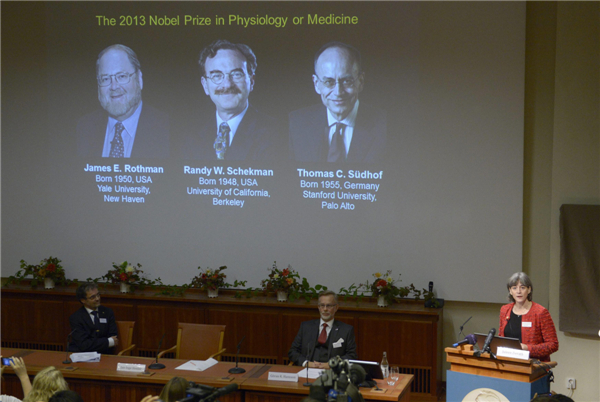

 |
|
Juleen Zierath (R), chairman of the Nobel committee for medicine or physiology, speaks during the announcement of the winners of the 2013 Nobel prize for medicine or physiology at the Nobel Assembly at the Karolinska Institute in Stockholm October 7, 2013. Two Americans, James Rothman and Randy Schekman, and Germany's Thomas Sudhof won the 2013 Nobel prize for medicine or physiology for research into how the cell organises its transport system, the award-giving body said on Monday. [Photo/Agencies] |
STOCKHOLM - Three scientists shared the 2013 Nobel Prize in Physiology or Medicine, announced the Nobel Assembly at Swedish Karolinska Institute in Stockholm on Monday.
"The Nobel Assembly at Karolinska Institute has today decided to award the Nobel Prize in Physiology or Medicine 2013 jointly to James E. Rothman, Randy W. Schekman and Thomas C. Sudhof for their discoveries of machinery regulating vesicle traffic, a major transport system in our cells," said Goran Hansson, Secretary of the Nobel Assembly at Swedish Karolinska Institute.
Through their discoveries, Rothman, Schekman and Sudhof have revealed the exquisitely precise control system for the transport and delivery of cellular cargo," the assembly said in a statement.
Schekman identified three classes of genes that control different facets of the cell's transport system, providing new insights into the tightly regulated machinery that mediates vesicle transport in the cell, according to the statement.
Rothman discovered in the 1990s that a protein complex enables vesicles to dock and fuse with their target membranes and his findings together with Schekman's discovery, revealed an ancient evolutionary origin of the transport system.
Sudhof's research was based on the discovery of machinery by Schekman and Rothman and his discovery explained how temporal precision is achieved and how vesicles' contents can be released on command, it added.
"These discoveries have had a major impact on our understanding of how cargo is delivered with timing and precision within and outside the cell," the statement said, adding that defective vesicle transport occurs in a variety of diseases including a number of neurological and immunological disorders, as well as in diabetes. Without this wonderfully precise organization, the cell would lapse into chaos.
Rothman was born in the United States in 1950 and he received his PhD from Harvard Medical School in 1976 and moved in 1978 to Stanford University in California, where he started his research on the vesicles of the cell. Currently Rothman is Professor and Chairman in the Department of Cell Biology at Yale University.
Born in the United States in 1948, Schekman studied at the University of California in Los Angeles and at Stanford University, where he obtained his PhD, in the same department that Rothman joined a few years, under the supervision of Arthur Kornberg who won the Nobel Prize in 1959. Schekman is at present Professor at the University of California at Berkeley.
Sudhof was born in Germany in 1955 and moved to the University of Texas Southwestern Medical Center in Dallas of the United States as a postdoctoral fellow with Michael Brown and Joseph Goldstein, who shared the 1985 Nobel Prize in Physiology or Medicine. Sudhof was appointed Professor of Molecular and Cellular Physiology at Stanford University in 2008.
The annual Nobel Prizes are usually announced in October to commemorate the anniversary of the 1896 death of Alfred Nobel, a Swedish industrialist and the inventor of dynamite.
A total of 201 persons, including 10 women, have been awarded the Nobel Prize in Physiology or Medicine between 1901 and 2012. The prize consists of a medal, a personal diploma and a cash award of 8 million Swedish kronor (about 1.2 million U.S. dollars) for this year.







